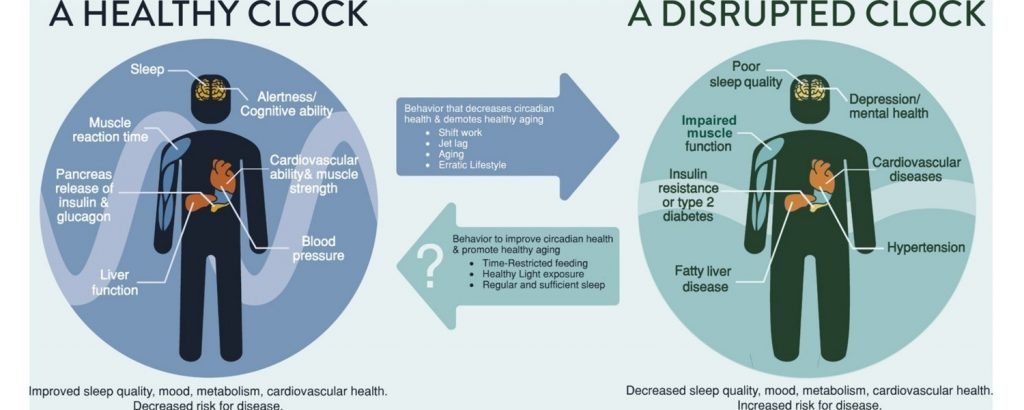
How to reset your circadian rhythm
How are circadian rhythms related to jet lag?
Jet lag occurs when you travel over several time zones quickly, and your body is not aligned to the time of your new environment. Your circadian rhythm is attuned to the place where you left, and it has to readjust. This may result in feeling tired during the day or feeling wide awake at night.
You may experience other changes that impact your well-being until your circadian rhythm normalizes again. It may take a day or up to a week to feel acclimated to the new time zone. It typically takes a day for each hour you shift to regulate your sleep-wake cycle.
You may even experience mild symptoms of jet lag when clocks fall backward or forward for daylight saving time. The disruption may not last too long, but your body may need a few days to adjust.
How to reset your circadian rhythm
You may experience disruptions to your circadian rhythm, but you can get it back on track. Here are some tips for promoting a healthy 24-hour schedule:
- Try to adhere to a routine each day.
- Spend time outdoors when it’s light outside to boost your wakefulness.
- Get enough daily exercise — 20 or more minutes of aerobic exercise is generally recommended.
- Sleep in an environment that promotes rest with proper lighting, a comfortable temperature, and a supportive mattress.
- Avoid alcohol, caffeine, and nicotine in the evenings.
- Power down your screens well before bedtime and try engaging in an activity such as reading a book or meditating.
- Don’t nap late in the afternoon or evening.

Sleep disorders
Sometimes alterations to your circadian rhythm may be the sign of a more serious condition like a circadian rhythm sleep disorder. Two of these disorders are advanced sleep phase and delaywq2ed sleep phase. You may be more susceptible to these if you work an irregular shift, have low vision, or are a teenager or older adult.
Delayed sleep phase disorder occurs when you go to bed and awaken 2 hours or more after most people. You may think of yourself as a “night owl.” Teenagers and young adults are more prone to this condition.
Advanced sleep phase disorder is the opposite of delayed sleep phase disorder. You actually fall asleep a few hours before most people and then awaken very early in the morning.
Disorders related to your circadian rhythm may result in having difficulty falling asleep at night, waking frequently throughout the night, and waking and not being able to go back to sleep in the middle of the night.
Symptoms related to these conditions include:
- insomnia
- sleep loss
- problems waking in the morning
- tiredness throughout the day
- depression or stress
Other conditions that are tied into your circadian rhythm include:
- jet lag, caused from traveling over several time zones quickly
- shift work disorder, caused by an off-hours job or a job with unpredictable hours
- irregular sleep-wake disorder, caused by an inability to set a regular sleep and wake schedule
Treating these conditions may include a variety of approaches. You may try to:
- set a more regular schedule
- use light therapy
- take medications or supplements like melatonin to fall asleep more easily
- try an intentional shift in your sleep implemented over several days or weeks
How do circadian rhythms affect health?
Maintaining your circadian rhythm is vital to your health. If you experience a disruption to your circadian rhythm and struggle to get the proper amount of sleep, you may experience both short-term and long-term effects to your health.
Disruption to your circadian rhythm can cause health conditions in several parts of the body in the long term. This includes your:
- organs
- cardiovascular system
- metabolism
- gastrointestinal system
- skin
You may also be more susceptible to diabetes, obesity, and mental health conditions.
Short-term disruptions to your circadian rhythm may result in:
- memory issues
- lack of energy
- delayed wound healing
- changes to your hormone cycle that may impact fertility
- problems with your digestion and bowels
- shifts in your body temperature
- What to Know About Being Unable to Control Emotions

- Top 7 AI-Powered Wearables for Longevity and Biohacking in 2026

- Beginner’s guide to cryptocurrency trading strategies

- Hippies: The 1960s Youth Movement That Redefined Freedom, Peace, and Love

- What is soft skill? Definition, Importance, and Examples

- Get Your Vitamin P: Why Pleasure Matters When It Comes to What You Eat


27.8.25
Morning all 💖
Good afternoon all guys ❤️😊
Thanks millions…..
✔
Nice Song
Very useful health knowledge!
Thanks
We go
Thanks,C4a💜
Thanks ❤️
This article is very useful for ‘Night Owl’ people… thanks in advance!
Circadian rhythm is very important for health..thanks for sharing information in detail.
I remember Strawberry 🍓 while I’m listening 🎶 this song.
Thanks for your article.
I wanna to this nice song.💜
Thanks you so much 💞
For C4a
Thank you so much, C4A team.